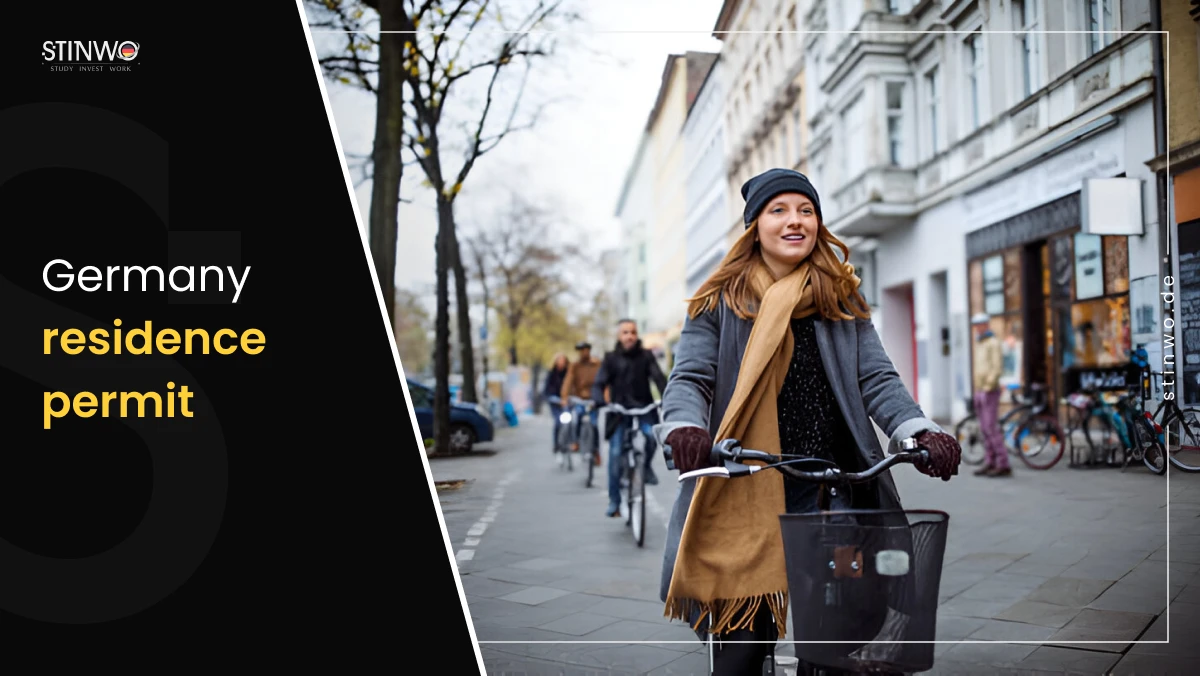Germany offers various legal pathways to obtain a residence permit, each tailored to the individual’s purpose of stay. Understanding these categories is essential for a successful application. Below, we provide a detailed guide on the different types of Germany residence permit, eligibility criteria, and benefits associated with each.
Work Based Germany Residence Permits
Germany is an attractive destination for skilled workers due to its strong economy and demand for specialized professionals.

Several work-based residence permits are available, depending on qualifications, job offers, and professional experience.
EU Blue card
This permit will be rewarded to highly skilled professionals and it requires:
- A recognized university degree.
- A job offer with a minimum salary of €45,300 (2024) or €41,041 for shortage professions.
This permit facilitates faster access to permanent residency, allowing holders to apply for permanent settlement in just 21 months if they achieve B1-level German proficiency. If not, the pathway takes 33 months. Additionally, Blue Card holders can bring their families without stringent German language requirements for spouses.
General Employment(Work Visa)
Non-EU nationals with a valid job offer can apply for this visa. The salary must align with German standards and requires approval from the Federal Employment Agency. This work visa is the most common choice for professionals who do not qualify for an EU Blue Card.
Skilled worker Visa(Fachkräfte)
This visa targets professionals with recognized qualifications or vocational training. Applicants must have either:
- A recognized university degree,
- A completed apprenticeship or vocational training that meets German standards.
This visa enables skilled workers to integrate into the German labor market and, in many cases, eventually apply for permanent residency.
IT Specialists(without degree)
Germany has a special provision for experienced IT specialists who may not have a formal university degree. If the applicant has at least three years of experience and meets the minimum salary threshold, they can apply for a work visa without the usual degree requirement. This program helps address the increasing demand for IT professionals in Germany.
Self-Employment Visa(Entrepreneurs & Freelancers)
- Entrepreneurs: Must present a viable business plan that benefits the German economy, with adequate funding and job creation potential.
- Freelancers: Must provide proof of contracts from German clients, demonstrating their ability to sustain themselves financially.
Freelancers, such as artists, writers, and independent consultants, find Germany attractive due to its vibrant creative industries.
Job seeker Visa
This visa allows skilled professionals to search for employment in Germany for up to six months. Requirements include:
- Proof of funds to sustain living expenses,
- Educational qualifications that match German labor market needs.
During this period, applicants cannot work. However, if they secure a job offer, they can transition to a work permit.
Ausbildung(Vocational Training) Visa
Non-EU students aiming to undertake apprenticeship programs in Germany can apply for this visa. Germany offers world-class vocational training opportunities, and students can often transition to a work permit post-completion.
Recognition Visa(Anerkennungsvisum)
For individuals whose foreign qualifications require partial recognition before employment, this visa allows them to undergo necessary adjustment training in Germany. After successful completion, they can transition into a regular work visa.
Researcher Visa
Designed for academics and researchers with contracts at German universities or research institutes. This visa supports Germany’s research and development sectors.
EU Intra-Company Transfer (ICT) Card
Allows employees of multinational companies to be transferred to German branches while maintaining an employment contract with their home company.
Study Based Residence Permits
Germany is home to some of the world’s most prestigious universities and offers excellent opportunities for international students. To study in Germany, non-EU students require a Germany residence permit based on their educational status. The country provides various permits for students enrolled in degree programs, language courses, or those seeking jobs after graduation.

These residence permits allow students to work part-time and offer pathways to long-term residence and employment in Germany. You can find the information related to the study based Germany residence permit in the table below:
| Visa Type | Description |
|---|---|
| Student Visa | For those accepted into German universities. Can work part-time (120 full or 240 half days per year). |
| Study Preparation Visa | For students preparing for university admission in Germany (Language Course or Studienkolleg). |
| Student Job-Seeker Visa | After graduation, students can stay for 18 months to find a job. |
Family Based Residence Permits
Germany recognizes the importance of family unity and provides residence permits for family members of German citizens and legal residents. These permits allow spouses, children, and other dependents to live in Germany and, in some cases, work or study. Family reunification is a key aspect of German immigration policy, ensuring that individuals can build a stable and fulfilling life with their loved ones in the country.
Family Reunion Visa
- For spouses, children, and other dependent family members.
- Spouses of German citizens or residents can apply.
Marriage-Based Residency
- If you marry a German citizen, you get a family residence permit.
- Must prove basic German language skills (A1).
Humanitarian & Special Cases
Germany provides residence permits for individuals facing humanitarian challenges, ensuring protection and opportunities for integration. These permits apply to asylum seekers, refugees, and those who have lived in Germany for an extended period without legal status but have demonstrated successful integration. In addition, long-term residents who meet specific criteria may apply for permanent residency, offering them stability and a secure future in Germany.
Asylum & Refugee Status
- For people who face persecution in their home countries.
Permanent Residency for Long-Term Residents
- After 33 months with an EU Blue Card or *5 years with a normal work visa, you can apply for a *permanent residence permit.
- If you have *B1 German, you can apply after *21 months with an EU Blue Card.
Special Integration Residency
- For people who have lived in Germany for many years without legal status but have integrated well.
Investment-Based Residency
Germany provides opportunities for investors and entrepreneurs seeking to establish businesses in the country. A Germany residence permit based on investment can be obtained by individuals who contribute to the German economy through substantial business investments.

This type of residency is particularly attractive to business owners, startup founders, and high-net-worth individuals looking to expand their operations in Germany. By creating jobs and fostering economic growth, investors can secure long-term residency and, in some cases, a pathway to permanent settlement.
Business Investment Visa
If you invest in a German business and create jobs, you may qualify for a Germany residence permit. The investment must demonstrate a significant contribution to the German economy, such as generating employment opportunities, fostering innovation, or filling gaps in the market. Additionally, applicants should provide a solid business plan outlining their venture’s sustainability and potential impact.
In some cases, a minimum investment threshold may apply, and approvals may require consultation with local economic authorities. If successful, investors can obtain long-term residency and, eventually, apply for permanent settlement in Germany.
Conclusion
Germany offers a wide range of residence permits, making it an attractive destination for skilled workers, students, entrepreneurs, and family members seeking to live and work in the country. Understanding the specific requirements for each permit category is essential for a smooth application process. Whether you are looking for career opportunities, quality education, family reunification, or investment prospects, Germany provides structured pathways for legal residence and long-term integration. Additionally, with options for permanent residency and naturalization, Germany remains one of the best destinations for those looking to establish a future in Europe.
